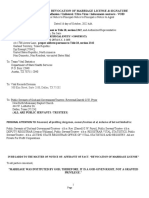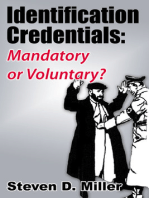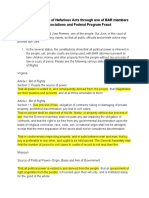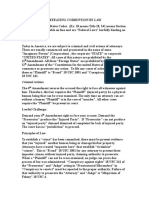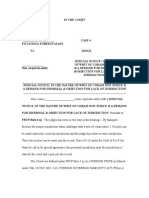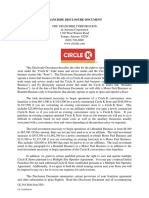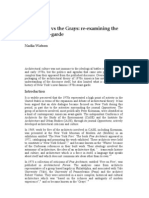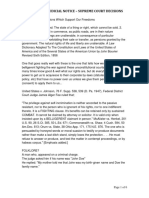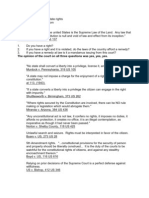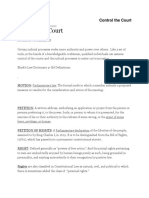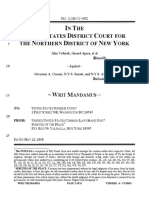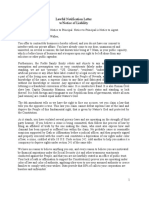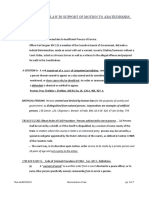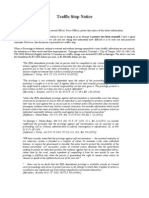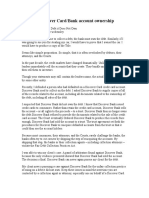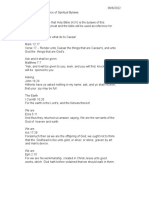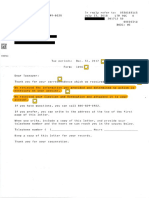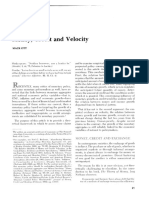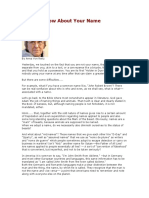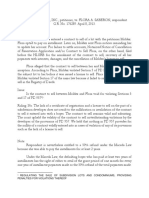Professional Documents
Culture Documents
Courts Are Free If You Don T Read and Learn This You Will End Up Paying Between 300 and 600 Dollars To File A Court Case
Courts Are Free If You Don T Read and Learn This You Will End Up Paying Between 300 and 600 Dollars To File A Court Case
Uploaded by
Bar RiOriginal Description:
Original Title
Copyright
Available Formats
Share this document
Did you find this document useful?
Is this content inappropriate?
Report this DocumentCopyright:
Available Formats
Courts Are Free If You Don T Read and Learn This You Will End Up Paying Between 300 and 600 Dollars To File A Court Case
Courts Are Free If You Don T Read and Learn This You Will End Up Paying Between 300 and 600 Dollars To File A Court Case
Uploaded by
Bar RiCopyright:
Available Formats
Subject: COURTS ARE FREE IF YOU DON'T READ AND LEARN THIS YOU WILL END UP
PAYING BETWEEN 300 AND 600 DOLLARS TO FILE A COURT CASE!
COURTS ARE FREE IF YOU DON'T READ AND LEARN THIS YOU WILL END UP PAYING
BETWEEN 300 AND 600 DOLLARS TO FILE A COURT CASE!
Plaintiffs, think the easiest way to show the facts, are we the sovereign people, first show what a
person is not; in the law. So we have our basis of the claim considering 28 U.S.C. 1914 –(District
court; filing and miscellaneous fees; rules of court) which requires a person, or persons, to pay a
filing fee. Since a person, or persons, must pay the filing fee; one should denote what a person, is
according to law in the second to properly show both sides of the coin. Starting with the Supreme
Court decisions which denote the sovereign American people are not a person. Please see the
following
" 'in common usage, the term 'person' does not include the sovereign people, and statutes
employing the (word person) are normally construed to exclude the sovereign people.' Wilson v
Omaha Tribe, 442 US653 667, 61 L Ed 2d 153, 99 S Ct 2529 (1979) (quoting United States v
Cooper Corp. 312 US 600, 604, 85 L Ed 1071, 61 S Ct 742 (1941). See also United States v Mine
Workers, 330 US 258, 275, 91 L Ed 884, 67 S Ct 677 (1947)" Will v Michigan State Police, 491 US
58, 105 L. Ed. 2d 45, 109 S.Ct. 2304 b)
The sovereign people are not a person in a legal sense” In re Fox, 52 N. Y. 535, 11 Am. Rep. 751;
U.S.v. Fox, 94 U.S. 315, 24 L. Ed. 192.
A corporation is not a citizen within the meaning of that provision of the Constitution, which declares
that the citizens of each State shall be entitled to all the privileges and immunities of citizens of the
several States. Special privileges enjoyed by citizens in their own States are not secured in other
States by this provision such as grants of corporate existence and powers. States may exclude a
foreign corporation entirely or they may exact such security for the performance of its contracts with
their citizens as, in their judgment, will best promote the public interest.
[Paul v. Virginia, 8 Wall (U.S.) 168; 19 L.Ed 357 (1868)]
We now know what a person is not, so let us see what a person is, the following definition of person
was found in BLACKS LAW DICTIONARY 5TH EDITION PG 1028
Person. In general usage, a human being (i.e. natural person), though by statute term may include a
firm, labor organizations, partnerships, associations, corporations, legal representatives, trustees,
trustees in bankruptcy, or receivers. National Labor Relations Act, § 2(1). Bankruptcy Act. "Person"
includes individual, part¬nership, and corporation, but not governmental unit. Sec. 101(30).
Corporation. A corporation is a "person" within meaning of equal protection and due process
provi¬sions of United States Constitution. Allen v. Pavach, Ind., 335 N.E.2d 219, 221; Borreca v.
Fasi, D.C.Ha¬waii, 369 F.Supp. 906, 911. The term "persons" in statute relating to conspiracy to
commit offense against United States, or to defraud United States, or any agency, includes
corporation. Alamo Fence Co. of Houston v. U. S., C.A.Tex., 240 F.2d 179, 181. Foreign government.
Foreign governments other¬ wise eligible to sue in U.S.
courts are "persons" entitled to bring treble-damage suit for alleged anti¬ trust violations under
Clayton Act, Section 4. Pfizer, Inc. v. Government of India, C.A.Minn., 550 F.2d 396. Illegitimate
child. Illegitimate children are "persons" within meaning of the Equal Protection Clause of the
Fourteenth Amendment, Levy v. Louisiana, 391 U.S. 68, 88 S.Ct. 1509, 1511, 20 L.Ed.2d 436; and
scope of wrongful death statute, Jordan v. Delta Drilling Co., Wyo., 541 P.2d 39, 48. Interested
person. Includes heirs, devisees, offspring (biological property, never use child), spouses,
creditors, beneficiaries and any others hav¬ing a property right in or claim against a trust estate or
the estate of a decedent, ward or protected person which may be affected by the proceeding. It also
includes persons having priority for appointment as personal representative, and other fiduciaries
repre¬senting interested persons. The meaning as it relates to particular persons may vary from time
to time and must be determined according to the particular pur¬poses of, and matter involved in, any
proceeding. Uniform Probate Code, § 1-201(20). Municipalities. Municipalities and other government
units are "persons" within meaning of 42 U.S.C.A. § 1983. Local government officials sued in their
official capacities are "persons" for purposes of Sec¬ tion 1983 in those cases in which a local
govern¬ment would be sue able in its own name. Monell v. N.Y. City Department of Social Services,
436 U.S. 658, 98 S.Ct. 2018, 56 L.Ed.2d 611. See Color of law. Protected person. One for whom a
conservator has been appointed or other protective order has been made Uniform, Probate Code §
5-101(3).
Now we must examine Supreme Court decisions, to get a definitive answer. Do the sovereign
people have to pay filling fees; or are they entitled to free, access of the courts?
The courts must realize the sovereign people (not sovereign citizens, never use that false term),
are not bound to pay filling fees as the sovereign people, are not a person, or persons. The use of
the word person the reason the sovereign; people have been paying for filling fees. It is the use of
the word person in law, and the confusion, the word person creates for the average sovereign
people, when used in law. A person is a corporation that is why the courts are not to be charging,
the sovereign people to pay filling fees falsely. They state the under Title 28 sec 1914 that
persons or a person must pay, so when the sovereign people, point out that only apply s to person or
persons which is a corporation, and the sovereign people need the law, that says the people or a
natural person, is required to pay filling fees, or receive free access as ordered by the Supreme
Court. Take Mandatory Judicial Notice and Cognizance under (Federal Rules of Evidence 201
(d) that “plaintiff” ie Libellant has a lawful right to proceed without cost, based upon the
following case law:
The US Supreme Court has ruled that a natural individual entitled to relief is “entitled to free
access to the natural peoples judicial tribunals and public offices in every State of the
Union”(2 Black 620, see also
Crandell v Nevada, 6 Wall 35]. Plaintiff (libellant) should not be charged fees or costs for the lawful
and Constitutional Protected Right to petition this court in this matter in which he/she is entitled to
relief, as it appears that the filing fee rule was originally implemented for fictions and subjects of the
State and should not be applied to the Plaintiff who is a natural individual and entitled to relief (Hale v
Hinkel, 201 US 43, NAACP v Button, 371 US 415); United Mineworkers v Gibbs, 383 US 715; and
Johnson v Avery, 89 S.Ct. 747 (1969).
Petitioner (libellant) cannot be charged a fee as no charge can be placed upon a citizen as a
condition precedent to exercise his/her Constitutional Protected Rights, his/her rights secured by the
Constitution. A fee is a charge “fixed by law for services fixed by public officers or for use of a
privilege under control of government.” Fort Smith Gas Co. v Wisemen” 189 Ark.675 74 SW.2d
789,790, from Black’s Law Dictionary 5th Ed.
The US Supreme Court has ruled that a natural person entitled to relief is “entitled to free access to
its judicial tribunals and public offices in every State of the Union(2 Black 620, see also Crandell v
Nevada, 6 Wall 35].
Plaintiff (libellant) should not be charged fees or costs for the lawful and Constitutional Right to
petition this court in this matter in which he/she is entitled to relief, as it appears that the filing fee
rule was originally implemented for fictions and subjects of the State and should not be applied to
the Plaintiff who is a natural individual and entitled to relief (Hale v Hinkel, 201 US 43,
NOTICE AND CONCLUSION IN LAW ( How you want to set it up)
So in closing it is clear petitioners /plaintiffs must have their funds, refunded if PLAINTIFFS have
paid under Title 28 U.S.C. 1914 – (District court; filing and miscellaneous fees; rules of court) or not
be charged at all, as the sovereign people are entitled to free access of the courts. Plaintiffs believe
this is proper, in any form, as the people’s tax dollars fund these courts. If the people are not, to have
free access then the tax dollars should stop flowing, for this purpose. Because it would mean the
courts, are receiving enumeration twice. Once by taxes then paid, again by the people paying for a
use of the courts, when, their tax dollars had already paid. Petitioners also respectfully demands the
Magistrate takes judicial notice of all herein under RULE 201 (d) which is adjudicated facts.
Petitioners also gives notice to the Magistrate, that the Magistrate is bound by US Supreme Court
rulings please see the following. Howlett V. Rose, 496 U.S. 356 (1990) Federal Law and Supreme
Court cases apply to State court cases. (Cooper v. Aaron, 358 U.S. 1) (1958)--States are bound by
United States Supreme Court Case decisions.
I/We declare swear and affirm under penalty of perjury that, to the best of my knowledge and belief,
the information herein is true, correct, and complete & pursuant to 28 U.S. Code § 1746 - Unsworn
declarations under penalty of perjury
For a crime to exist, there must be an injured party (Corpus Delicti) There can be no sanction
or penalty imposed on one because of this Constitutional Protected Right." Sherer v. Cullen
481 F. 945:
Supreme courts ruled "Without Corpus delicti there can be no crime"“In every prosecution
for crime it is necessary to establish the “corpus delecti”, i.e., the body or elements of the
crime.” People v. Lopez, 62 Ca.Rptr. 47, 254 C.A.2d 185.
"In every criminal trial, the prosecution must prove the corpus delecti, or the body of the crime
itself-i.e., the fact of injury, loss or harm, and the existence of a criminal agency as its cause. "
People v. Sapp, 73 P.3d 433, 467 (Cal. 2003) [quoting People v. Alvarez, (2002) 27 Cal.4th 1161,
1168-1169, 119 Cal.Rptr.2d 903, 46 P.3d 372.].
"As a general principal, standing to invoke the judicial process requires an actual justiciable
controversy as to which the complainant has a real interest in the ultimate adjudication
because he or she has either suffered or is about to suffer an injury. " People v. Superior
Court, 126 Cal.Rptr.2d 793.
“Without standing, there is no actual or justiciable controversy, and courts will not entertain
such cases. (3 Witlen, Cal. Procedure (3rd ed. 1985) Actions § 44, pp 70-72.) “Typically, … the
standing inquiry requires careful judicial examination of a complaint’s allegations to
ascertain whether the particular plaintiff is entitled to an adjudication of the particular claims
asserted. ” (Allen v. Wright, (1984) 468 U.S. 737, 752…Whether one has standing in a particular
case generally revolved around the question whether that person has rights that may suffer some
injury, actual or threatened. ” Clifford S. v. Superior Court, 45 Cal.Rptr.2d 333, 335
Please Make Amends Honor thy Oath Elected and public servants, title 5USC2906-3331 0ath of
office, title 18 241-242-
WHAT YOU DON'T KNOW-THE B.A.R. ASSOCIATION IS UNDER THE VATICAN OWNED CITY
OF LONDON WATER AND SEWER UTILITY AND THEY'RE COMMITTING TREASON AND WAR
CRIMES AGAINST AMERICA BY VIOLATING ARTICLES 16 AND 70 OF THE LIEBER CODE.
NOW THERE IS A REMEDY FOR CORRUPT JUDGES AND ATTORNEYS. BTW, THEY ARE NOT
JUDGES. THEY'RE BROKERS AS B.A.R. ATTORNEYS.
It is No injury or Property damage to any offspring (biological property), woman or man, thus the
State CORPS can not be an injured party that would be A lawful American's by Honoring thy Oath
office of servitude to God; false allegiance to the Treaty of 1213 of religious, cult, organizations are
The Foreign Agents Registration Act (FARA) Title 5 2906 3331-3333. Whereas Their is title 18 241
242.Merely being native born within the territorial boundaries of the United States of America
does not make such an inhabitant a Citizen of the United States subject to the jurisdiction of
the Fourteenth Amendment" ... Elk v. Wilkins, Neb (1884), 5s.ct.41,112 U.S. 99, 28 L. Ed. 643.
"The fact is, property is a tree; income is the fruit; labour is a tree; income the fruit; capital, the tree;
income the 'fruit.' The fruit, if not consumed (severed) as fast as it ripens, will germinate from the
seed... and will produce other trees and grow into more property; but so long as it is fruit merely, and
plucked (severed) to eat... it is no tree, and will produce itself no fruit." Waring v. City of Savennah.
60 Ga. 93, 100 (1878.}
Lawful Bloodline native 1868
Except for all city county and state immigrants servants State, county and municipal (city) employees
work, respectively, for those distinct divisions of government. All are public servants.
In 1868, there was a corporation founded and in that particular company, the founders of that
company called it the "United States Corporation" and they stipulated that anybody who would be a
member of that corporation or worked for that corporation, would be called, not an employee but a
"citizen". So today, if you are asked, ‘are you a citizen of the United States’, what you think you're
being asked is, 'are you lawfully in this country to do business?' but that's not lawfully, what's being
asked. They didn't ask you if you are an American, lawfully, they asked you a specific question... are
you, of your own volition, out of your own mouth testifying that you are a citizen of the United States
because in that way, citizen of the United States means you are an employee of a foreign
corporation, operating under international maritime law. So today, the President of United States is
the President of a privately owned company. The company is called "United States" and the word
"President", is always the word used in corporate law - banks have Presidents, all companies have
Presidents. President Trump is not the President of America. President Bush is the president of a
privately owned company, privately owned out of England. We need to understand words and
terms and they have been used to trick and enslave you...by signature of you rights over to
the newly form CORPS
US GOV Elected and public servants aka employees laughing about stealing land also raping and
robbing, kidnapping holding woman man and offspring (biological property) for ransom as filed
destroying family's for personal gain for the British foreign 1871 government contracted elected and
public servants service of employment Federal law,
When any officer , Judge , Attorney , Elected and Public Servants of the court has committed
"fraud upon the court", the orders and judgment of that court are void, of no legal force or
effect.
In 1994, the United States Supreme Court held that "Disqualification is required if an objective
observer would entertain reasonable questions about the judge's impartiality. If a Judge's attitude
or state of mind leads a detached observer to conclude that a fair and impartial hearing is
unlikely, the judge must be disqualified." [Emphasis added]. Liteky v. U.S., 114 S.Ct. 1147, 1162
(1994). That Court also stated that Section 455(a) "requires a judge to recuse himself in any
proceeding in which her impartiality might reasonably be questioned." Taylor v. O'Grady, 888 F.2d
1189 (7th Cir. 1989). In Pfizer Inc. v. Lord, 456 F.2d 532 (8th Cir. 1972), the Court stated that "It is
important that the litigant not only actually receive Justice
You might also like
- 1 - Notice - of - Revocation - of - Election - ROD CLASSDocument6 pages1 - Notice - of - Revocation - of - Election - ROD CLASSTitle IV-D Man with a plan90% (30)
- Basic Breakdown - Dealership ScamDocument5 pagesBasic Breakdown - Dealership ScamBar Ri100% (21)
- (Public) Revocation of Marriage License & SigDocument8 pages(Public) Revocation of Marriage License & SigBar Ri100% (6)
- Streetwear GuideDocument11 pagesStreetwear GuideBar Ri50% (2)
- PPC Portfolio PDFDocument11 pagesPPC Portfolio PDFMirena Boycheva67% (3)
- Retail Installment Contract - For Training Purposes OnlyDocument4 pagesRetail Installment Contract - For Training Purposes OnlyBar Ri100% (2)
- Study Notes ACCA - Financial Reporting PDFDocument211 pagesStudy Notes ACCA - Financial Reporting PDFLavinia Minoiu100% (1)
- Ds 11 Passport AppDocument6 pagesDs 11 Passport AppBar Ri100% (2)
- Defaultnotice TEMPLATEDocument3 pagesDefaultnotice TEMPLATEBar Ri100% (4)
- Identification Credentials: Mandatory or Voluntary?From EverandIdentification Credentials: Mandatory or Voluntary?Rating: 5 out of 5 stars5/5 (2)
- Court (Remedy by Non-Assumsit - Without Prejudice UCC 1-308)Document18 pagesCourt (Remedy by Non-Assumsit - Without Prejudice UCC 1-308)Paschal James Bloise100% (6)
- Corporations Cannot Be Sovereign GovernmentsDocument5 pagesCorporations Cannot Be Sovereign GovernmentsChemtrails Equals Treason100% (18)
- Constitutional Case LawDocument9 pagesConstitutional Case Lawapi-272831802100% (2)
- Birth Certificate LawDocument24 pagesBirth Certificate LawClyde Pointe100% (4)
- STOP Any Action by Holding PDFDocument19 pagesSTOP Any Action by Holding PDFBálint Fodor100% (21)
- Gods GiftDocument13 pagesGods GiftStephanie's World100% (9)
- Notice by Affidavit of Nefarious Acts Through Use of BAR Members and Associations and Federal Program FraudDocument5 pagesNotice by Affidavit of Nefarious Acts Through Use of BAR Members and Associations and Federal Program Fraudcas100% (8)
- 3 Coram Nobis 2010 Modified in 2012 For Judgment AgainstDocument9 pages3 Coram Nobis 2010 Modified in 2012 For Judgment Againstjoe100% (3)
- 005 Total Deprivation of RightsDocument6 pages005 Total Deprivation of RightsDouglas Duff100% (14)
- Defeating Corruption by LawDocument10 pagesDefeating Corruption by Lawjoe100% (5)
- United States Means A Federal CorporationDocument3 pagesUnited States Means A Federal Corporationin1or100% (4)
- Motion To File If Judge Does Not Follow The LawDocument5 pagesMotion To File If Judge Does Not Follow The LawRodolfo Becerra100% (8)
- Failure To Declare JurisdictionDocument6 pagesFailure To Declare Jurisdictionjpes100% (2)
- Fsia Coram Non Judice ObjectionDocument5 pagesFsia Coram Non Judice ObjectionDenise WellsNoch keine Bewertungen
- قاموس قانوني عربي انجليزيDocument10 pagesقاموس قانوني عربي انجليزيMhd Moukhtar AL Khani100% (3)
- CH 4 India's External RelationsDocument95 pagesCH 4 India's External RelationsKEERAVANI73% (15)
- (5 Copies) GRECCIO LITURGY 2020Document18 pages(5 Copies) GRECCIO LITURGY 2020Lloyd Paul Elauria0% (2)
- Circle KDocument491 pagesCircle Kpascal rosasNoch keine Bewertungen
- Whites Vs GreysDocument15 pagesWhites Vs GreysHazem Saleh40% (5)
- Affidavit Claims Caselaw Cps PaDocument6 pagesAffidavit Claims Caselaw Cps Pabrandon100% (5)
- 4-23-10 Rod Class Judicial Notice Issue 11 EditDocument77 pages4-23-10 Rod Class Judicial Notice Issue 11 Editgetsome100% (3)
- 6 23 11 New Dismissal TemplateDocument12 pages6 23 11 New Dismissal Templatecalqlater100% (5)
- These Supreme Court Cases From Digging Around Are Generally From The Common LawDocument12 pagesThese Supreme Court Cases From Digging Around Are Generally From The Common LawGary Krimson100% (6)
- Fair Warning Not A ThreatDocument3 pagesFair Warning Not A ThreatBrian Kissinger100% (3)
- TBS Supreme Court Decisions Which Support Our FreedomsDocument6 pagesTBS Supreme Court Decisions Which Support Our FreedomsDUTCH551400100% (2)
- Generic Corporate Denial AffidavitDocument19 pagesGeneric Corporate Denial AffidavitJOHN100% (7)
- An Inexplicable Deception: A State Corruption of JusticeFrom EverandAn Inexplicable Deception: A State Corruption of JusticeNoch keine Bewertungen
- Your Day in Court: Using Common Law with Common SenseFrom EverandYour Day in Court: Using Common Law with Common SenseRating: 5 out of 5 stars5/5 (2)
- Color of Law - Status and Codes Are Not Law - PassportDocument3 pagesColor of Law - Status and Codes Are Not Law - PassportChris Lecce100% (13)
- U.S. DE FACTO - V - U.S.A. DE JURE CONSTITUTIONSDocument2 pagesU.S. DE FACTO - V - U.S.A. DE JURE CONSTITUTIONSAusarptahre100% (5)
- He Who Does Not Speak The Truth Freely Is A Traitor To The TruthDocument4 pagesHe Who Does Not Speak The Truth Freely Is A Traitor To The TruthMike Sisco100% (3)
- I Deny Unconscionable Contracts.x3Document16 pagesI Deny Unconscionable Contracts.x3mas100% (6)
- Good Source File Lean With Insurance Commissioner On Their Bonds (2018!10!07 07-07-38 UTC)Document24 pagesGood Source File Lean With Insurance Commissioner On Their Bonds (2018!10!07 07-07-38 UTC)Rodolfo Becerra100% (8)
- Defeating Corruption by LawDocument10 pagesDefeating Corruption by LawWillAsher100% (4)
- REMEDY Article III State Judiciary CourtDocument14 pagesREMEDY Article III State Judiciary Courtcindy watson89% (9)
- Constitutional Rights Vs State RightsDocument7 pagesConstitutional Rights Vs State RightsCoalbunny100% (4)
- Corpus DelectiDocument4 pagesCorpus DelectiKevin Yohburt50% (2)
- Statutes, Codes, Rules & Regulations Statutes Are Not LawsDocument5 pagesStatutes, Codes, Rules & Regulations Statutes Are Not LawsKevin Arthur Hodgins100% (4)
- Step 09 - Oath of Office Laws.Document1 pageStep 09 - Oath of Office Laws.Kevin Talbert100% (2)
- Free Your Self - in Propria PersonaDocument12 pagesFree Your Self - in Propria PersonaBob Johnson100% (4)
- Notice and Demand To Show Cause or Abate The Above Entitled ActionDocument5 pagesNotice and Demand To Show Cause or Abate The Above Entitled Actionliz knightNoch keine Bewertungen
- Every Man Is Independent of All LawsDocument4 pagesEvery Man Is Independent of All LawsCommon Vine Media100% (5)
- Government Authority 20pgs 2019-05-06Document20 pagesGovernment Authority 20pgs 2019-05-06tafilli54100% (4)
- Motion To Disqualify Judge Bernasette Bayne and StayDocument22 pagesMotion To Disqualify Judge Bernasette Bayne and StaySLAVEFATHERNoch keine Bewertungen
- Control The CourtDocument7 pagesControl The CourtRodolfo Becerra100% (6)
- Free Your Self - Reserve Your Rights OftenDocument12 pagesFree Your Self - Reserve Your Rights OftenPublic Knowledge100% (30)
- An Action Is Not Given To One Who Is Not InjuredDocument4 pagesAn Action Is Not Given To One Who Is Not Injuredin1or100% (9)
- Answer To Criminal Charge Challenge JurisdictionDocument9 pagesAnswer To Criminal Charge Challenge JurisdictionLamont Ryland100% (2)
- 18 05 22 Writ MandamusDocument6 pages18 05 22 Writ MandamusDennis Lee100% (2)
- State Citizenship Case LawsDocument2 pagesState Citizenship Case LawsJimmy BennettNoch keine Bewertungen
- Judge Dale Sovereign CitizensDocument3 pagesJudge Dale Sovereign CitizensDarrell Wilson100% (2)
- Motion To Vacate and RecallDocument62 pagesMotion To Vacate and Recallapi-37982610% (1)
- Notice To The Clerk of The Court To Provide Evidence of Injury in Fact or You Will File Default Judgment For Lack of Personal JurisdictionDocument12 pagesNotice To The Clerk of The Court To Provide Evidence of Injury in Fact or You Will File Default Judgment For Lack of Personal JurisdictionKevin Talbert100% (13)
- The BAR CardDocument3 pagesThe BAR CardFreeman Lawyer100% (1)
- Final-Lawful Notification LetterDocument7 pagesFinal-Lawful Notification LetterDavid Fields100% (1)
- 1005 Judicial Notice To MagistrateDocument6 pages1005 Judicial Notice To MagistrateJosh Roark100% (2)
- Fake Law Fake CourtsDocument6 pagesFake Law Fake CourtsBarbara Rowe100% (2)
- Dismiss ArtificialDocument7 pagesDismiss ArtificialKevin Talbert100% (2)
- Misprision of A FelonyDocument8 pagesMisprision of A Felonyjoy larsonNoch keine Bewertungen
- Traffic Stop Notice 1Document4 pagesTraffic Stop Notice 1trthseekr76100% (9)
- Constitutional and Statutory Provisions Involved, Petition No. 12-7747Document62 pagesConstitutional and Statutory Provisions Involved, Petition No. 12-7747Neil Gillespie100% (2)
- Nassau Lawyer November 2017Document28 pagesNassau Lawyer November 2017Bar RiNoch keine Bewertungen
- My Home Is MineDocument38 pagesMy Home Is MineBar Ri100% (1)
- Bill of Particulars TEMPLATE76Document3 pagesBill of Particulars TEMPLATE76Bar RiNoch keine Bewertungen
- Lawyers-Discover Card-Bank Account OwnershipDocument1 pageLawyers-Discover Card-Bank Account Ownershipjoy doleNoch keine Bewertungen
- 3 Baker-GreenDocument60 pages3 Baker-GreenBar RiNoch keine Bewertungen
- debtvalidationTEMPLATE 1 4Document2 pagesdebtvalidationTEMPLATE 1 4Bar RiNoch keine Bewertungen
- LTR Comm Empl Stop WithholdingDocument17 pagesLTR Comm Empl Stop WithholdingBar RiNoch keine Bewertungen
- Csi-Tica Trust PDFDocument4 pagesCsi-Tica Trust PDFZion50% (2)
- A 4 V TEMPLATEDocument3 pagesA 4 V TEMPLATEBar RiNoch keine Bewertungen
- FOIA Request ROEDocument1 pageFOIA Request ROEBar RiNoch keine Bewertungen
- Aff of Revoc Sign 5Document2 pagesAff of Revoc Sign 5Bar RiNoch keine Bewertungen
- Spiritual by LawsDocument2 pagesSpiritual by LawsBar RiNoch keine Bewertungen
- Sample Letter96cDocument2 pagesSample Letter96cBar RiNoch keine Bewertungen
- ObstructiveclerksDocument3 pagesObstructiveclerksBar Ri100% (1)
- Termination w4 AgreementDocument1 pageTermination w4 AgreementBar Ri100% (2)
- Money May1982Document14 pagesMoney May1982Bar RiNoch keine Bewertungen
- 2022 Diverse Founder Report VfinalDocument30 pages2022 Diverse Founder Report VfinalBar RiNoch keine Bewertungen
- Racial Discrimination in The Sharing Economy: Evidence From Airbnb Markets Across The WorldDocument25 pagesRacial Discrimination in The Sharing Economy: Evidence From Airbnb Markets Across The WorldBar RiNoch keine Bewertungen
- StolennamesDocument2 pagesStolennamesBar RiNoch keine Bewertungen
- SendthemabillDocument1 pageSendthemabillBar Ri100% (1)
- MoreaboutyournameDocument2 pagesMoreaboutyournameBar RiNoch keine Bewertungen
- YournamepleaseDocument2 pagesYournamepleaseBar RiNoch keine Bewertungen
- Race and Entrepreneurial Success Black - Asian - andDocument15 pagesRace and Entrepreneurial Success Black - Asian - andBar RiNoch keine Bewertungen
- 0 - Missio Ad GentesDocument19 pages0 - Missio Ad GentesPajes Julius FrederickNoch keine Bewertungen
- PDF Annual Report PT Argo Pantes TBK (2017) Financial Statement PDFDocument140 pagesPDF Annual Report PT Argo Pantes TBK (2017) Financial Statement PDFMaruli AmbaritaNoch keine Bewertungen
- Essay Writing by Suhani Gupta VIII IXORADocument3 pagesEssay Writing by Suhani Gupta VIII IXORASuhani GuptaNoch keine Bewertungen
- Literary MovementsDocument2 pagesLiterary MovementsROBERT EDUARD LOGHINNoch keine Bewertungen
- CIR Vs First Express - Case DigestDocument2 pagesCIR Vs First Express - Case DigestKaren Mae ServanNoch keine Bewertungen
- A Detailed Lesson Plan in EnglishDocument9 pagesA Detailed Lesson Plan in EnglishhutkumfuruNoch keine Bewertungen
- Moldex Realty, Inc. vs. Saberon, G.R. No. 176289, April 8, 2013.Document2 pagesMoldex Realty, Inc. vs. Saberon, G.R. No. 176289, April 8, 2013.dotadotaNoch keine Bewertungen
- Summary On Ra 8371Document6 pagesSummary On Ra 8371Ken AmorinNoch keine Bewertungen
- Marketing Plan of Pran Frooto: Shariful IslamDocument25 pagesMarketing Plan of Pran Frooto: Shariful IslamEnglish with Syed Nafees AhemedNoch keine Bewertungen
- 2019 USTMA Scrap Tire Management Summary ReportDocument20 pages2019 USTMA Scrap Tire Management Summary ReportBenjamin GonzalezNoch keine Bewertungen
- Dunwall Archives 20148888 PDF Free - DjvuDocument158 pagesDunwall Archives 20148888 PDF Free - DjvuGustavoNoch keine Bewertungen
- The Anaplan WayDocument103 pagesThe Anaplan Waysrinivasa2Noch keine Bewertungen
- Women and Mining PDFDocument158 pagesWomen and Mining PDFRichard BalaisNoch keine Bewertungen
- Canvas SHS Pe 3 Week 2Document3 pagesCanvas SHS Pe 3 Week 2Princess Manelle de VeraNoch keine Bewertungen
- The Village BlacksmithDocument32 pagesThe Village BlacksmithLouie PascualNoch keine Bewertungen
- Castilian Spanish PDFDocument5 pagesCastilian Spanish PDFVelaPulsarNoch keine Bewertungen
- Synology RS406 DataDocument2 pagesSynology RS406 DataPepe Fernandez TapiaNoch keine Bewertungen
- 08 Insular Hotel Employees Union VDocument3 pages08 Insular Hotel Employees Union VcagrnsNoch keine Bewertungen
- Aeroshell Book 10busspecsDocument8 pagesAeroshell Book 10busspecsDerqui Andres Avalo100% (1)
- Ziel b2Document3 pagesZiel b2Abhijeet ChopraNoch keine Bewertungen
- Price Action Trading Scalping Bob VollmanDocument10 pagesPrice Action Trading Scalping Bob Vollmanbhavik poshiyaNoch keine Bewertungen
- Rba Sliding Bearing CatalogDocument1 pageRba Sliding Bearing Catalogapi-308710986Noch keine Bewertungen
- Painter - "Territory-Network"Document39 pagesPainter - "Territory-Network"c406400100% (1)


